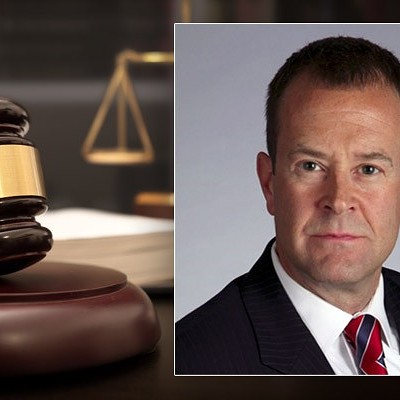On Feb. 17, a Lawrenceville business-owner waited as each case ahead of her own was marked off the docket in the courtroom of Allegheny County Common Pleas Judge Lester Nauhaus. That morning, Nauhaus had heard cases with charges ranging from reckless driving to unpaid fines. After hearing several cases on underage drinking, he quipped, “If it weren’t for stupid, I’d be unemployed.”
As the business-owner’s case was called, she rose briskly from her seat, her face stony, as though preparing for a battle. The male defendant in the case, a former vendor who had been charged with harassment and trespassing at her business, sat just a few rows away. He had already been convicted on the charges and was now representing himself in this appeal hearing.
After the woman took the stand, she told the court about her experience with the defendant that led to the charges of harassment and trespassing. At one point, she said, the defendant told her she could compensate him for the sale of a refrigerator with “a blow job.”
“Alright, listen to me, I have a president who talks worse than that,” Nauhaus said in response, addressing the courtroom. “That’s not guilty,” he said, overturning the harassment charge.
While women’s-rights advocates say Nauhaus’ handling of this case crossed the line, this kind of comment is not rare for him. His behavior in high-profile cases over the past two decades has seen him quoted in a number of newspaper pieces. And lawyers on Grant Street have often criticized him.
“Lawyers have called me,” says Sam Stretton, an attorney from the Philadelphia area with 45 years of experience, who has come to know of Nauhaus by reputation over the years. “Sometimes his demeanor and his comments are less than desirable for a judicial officer.”
Voters have the chance to oust judges they disagree with in retention elections every 10 years. Nauhaus’ last retention vote occurred in 2007. According to a 2007 Pittsburgh Post-Gazette article, he was strongly opposed by the Fraternal Order of Police on the grounds that he was “too soft on criminals and anti-police.” However, he remained on the bench.
Now, at age 73, Nauhaus is officially retired. However, when he turned 70, he was approved for senior status by the state court administrator. Senior status allows retired judges to continue to serve the Commonwealth if there is a need.
According to David Blaner, executive director of the Allegheny County Bar Association, senior judges can be assigned to any court in Allegheny County and give up their full commission to work part time in sectors where there are a backlog of cases or conflicts of interest.
But approved senior status doesn’t exempt a judge from criticism from within the legal system. “Nauhaus is no longer a part of the retention cycle, but senior judges are subject to the same codes of conduct as any other judge,” says Blaner.
The case that put the Lawrenceville business-owner in Nauhaus’ courtroom in February began on Sept. 20, 2016, when she filed a criminal complaint with Pittsburgh police against the defendant. According to the police report, the defendant had offered to sell her a refrigerator after they met at her business. When she asked the defendant how much he wanted for the refrigerator, he replied, “A blow job should cover it.” This exchange was witnessed by two other people. The victim, though feeling “demoralized,” settled on a monetary sum. Upon delivery, the refrigerator was broken. After she attempted to contact the defendant repeatedly, he responded that the witness “could do as she wished with it.” The woman returned the refrigerator to his storage space.
The next day, the woman testified in court, the defendant was waiting at her shop as she arrived. He wanted to talk and the victim said she “informed him I didn’t want to have a conversation.” Walking into her business, she told him “he wasn’t welcome” and he “forced his way in.” She told the court that the man sat at the counter and stared at her; she threatened to call the police and he left before officers arrived. She says she cut all ties with the man and asked him not to contact her. The next day she says he emailed her and she filed a complaint with police.
Nauhaus’ colleague Judge James Hanley, who had presided over the initial hearing, found the defendant guilty on charges of both harassment and trespass. In the appeal, Nauhaus found the defendant not guilty on the charge of harassment and guilty of trespass. With the dismissal of the harassment charge, the victim lost any protections the conviction would have provided her.
At February’s appeal hearing, Nauhaus told the victim that if she didn’t want to experience further harassment from the defendant, she should have severed the business relationship. In finalizing his judgment, he said, “If I found people guilty of harassment for inappropriate conversations, I would be here all day. This is silly.”
But Emily May, executive director of Hollaback!, an organization that seeks to end harassment and promote gender justice, disagrees.
“I can’t imagine there being a more textbook example of harassment ... Is this judge just empathizing with this harassing man?” May asks. “Where is this coming from and what’s ultimately perpetuating this?
“At the end of the day I feel like it’s toxic masculinity combined with this culture that we live in where sexism is dominant. Here’s this woman just trying to get a refrigerator. It’s the most simple thing.”
May also takes issue with the reasons Nauhaus gave for dismissing the harassment charge.
“I think [the comment about President Trump is] a great example where we see standards shifting. Here’s a world in [which] we have a president who’s been accused of rape multiple times, who’s talked about grabbing women by the pussy. ... [B]ecause it’s coming from our highest office, [it] starts normalizing itself, in ways that people are literally pointing to in their decision-making,” she says. “That’s really terrifying,”
CP reached out by phone to Nauhaus for comment. Regarding his remark during his judgment on the harassment charge, he said, “It was an off-handed remark” and that as to the actual ruling, “We live in a society that is sometimes not how we would like it to be. It’s not criminal.”
But Stretton, the Philadelphia-based attorney, feels differently. “In my mind, that would be totally inappropriate for a judge to reference, so casually, comments by the president of the United States that had nothing to do with this particular case. Demeanor is a critical part of being a judge. You don’t have the right to just shoot off your mouth and say the first thing that comes into your brain when you’re sitting on the bench,” says Stretton, who has specialized in representing attorneys and judges in ethics matters.
And Stretton echoed May’s criticism of Nauhaus’ claim that the harassment charge was “silly.”
“From the perspective of the victim, things that are minor which maybe to this judge don’t seem important can really affect one’s quality of life,” Stretton says. “I think this clearly gets to the point of interfering or being overly critical of victims or discouraging them from coming forward.”
According to her victim-impact statement, sent to CP, the woman in this case says her experience with the defendant has negatively affected her day-to-day life. She lost 20 pounds and has had trouble sleeping. She also feels compelled to avoid any business gatherings at which the defendant might be present. Given the small subset of the community in which she and the defendant work, the witness has lost opportunities to advance her business as a result.
She has also begun trauma-focused therapy through the Center for Victims, and self-defense classes. And she says her experience in Nauhaus’ courtroom has damaged her further.
“I now understand that the secondary trauma of the verdict, is actually worse because I discovered that my society doesn’t protect me and doesn’t care about me and I’m not valued. And I feel very vulnerable,” she says, “If I could talk to the judge, there’s a lot of things I would like to say to him; ‘You abused your power. ... Your being a judge makes our city less safe.’”
Starting in the 1970s, Nauhaus worked as a public defender in Allegheny County, and later came to head that office. He was first elected as a Common Pleas Court Judge in 1997. His career has been marked by incidents in which his judgment and conduct have been called into question, most notably in the criminal cases of former State Supreme Court Justice Joan Orie Melvin, in 2013, and former Allegheny County Councilman Chuck McCullough, in 2015.
According to a 2014 Pittsburgh Tribune-Review article, Nauhaus sentenced Melvin to three years’ house arrest and ordered the former judge to write letters of apology on photographs of herself in handcuffs as a part of her sentence for corruption. The photos would be sent to every judge in the state. During the appeal, the Supreme Court — ruling that this had been done to humiliate Melvin — altered the sentence to remove the requirement that the letters include a photograph.
In the case of McCullough, who was charged with theft, the District Attorney’s office investigated claims that Nauhaus told McCullough’s first attorney to opt for a bench trial (with Nauhaus presiding) instead of a jury trial. In addition, McCullough’s attorney alleged that Judge Nauhaus made “flippant” and “peculiar comments,” and said that the judge was biased against McCullough.
For Stretton, who has been hearing these kinds of claims for years, Nauhaus’ demeanor on the bench is clearly unacceptable. “You should never make a victim feel bad, if you can avoid it. That kind of comment is just not appropriate. If you don’t want to be a judge, don’t be a judge. If you don’t want to be there all day, you don’t have to be. Resign your commission.”
Editor’s Note: Because this story focuses on public comments made by Judge Lester Nauhaus and not the case per se, City Paper has chosen not name to the victim or the defendant in this case.



















